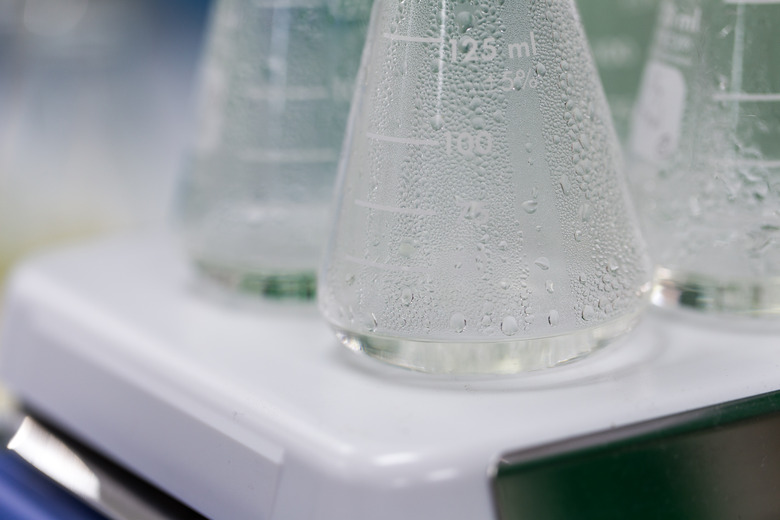How To Calculate The Time To Heat An Object
Different materials heat up at different rates, and calculating how long it will take to raise an object's temperature by a specified amount is a common problem for physics students. To calculate it, you need to know the specific heat capacity of the object, the mass of the object, the change in temperature you're looking for and the rate at which heat energy is supplied to it. See this calculation performed for water and lead to understand the process and how it's calculated in general.
TL;DR (Too Long; Didn't Read)
Calculate the heat (_Q_) required using the formula:
_Q_ = _mc_∆_T_
Where _m_ means the mass of the object, _c_ stands for the specific heat capacity and ∆_T_ is the change in temperature. The time taken (_t_) to heat the object when energy is supplied at power _P_ is given by:
_t_ = _Q_ ÷ _P_
1. Calculate the Change in Temperature in Celsius or Kelvin
The formula for the amount of heat energy required to produce a certain change in temperature is:
_Q_ = mc∆T
Where m means the mass of the object, c is the specific heat capacity of the material it's made from and ∆T is the change in temperature. First, calculate the change in temperature using the formula:
∆T = final temperature – starting temperature
If you're heating something from 10° to 50°, this gives:
∆T = 50° – 10°
= 40°
Note that while Celsius and Kelvin are different units (and 0 °C = 273 K), a change of 1 °C equals a change of 1 K, so they can be used interchangeably in this formula.
2. Find the Specific Heat Capacity of the Material
Every material has a unique specific heat capacity, which tells you how much energy it takes to heat it up by 1 degree Kelvin (or 1 degree Celsius), for a specific amount of a substance or material. Finding the heat capacity for your specific material often requires consulting online tables (see Resources), but here are some values for c for common materials, in joules per kilogram and per Kelvin (J/kg K):
Alcohol (drinking) = 2,400
Aluminum = 900
Bismuth = 123
Brass = 380
Copper = 386
Ice (at −10° C) = 2,050
Glass = 840
Gold = 126
Granite = 790
Lead = 128
Mercury = 140
Silver = 233
Tungsten = 134
Water = 4,186
Zinc = 387
Choose the appropriate value for your substance. In these examples, the focus will be on water (c = 4,186 J/kg K) and lead (c = 128 J/kg K).
3. Find the Mass and Calculate the Heat Required
The final quantity in the equation is m for the mass of the object. In short, it takes more energy to heat a larger amount of a material. So for the example, imagine you're calculating the heat required to heat 1 kilogram (kg) of water and 10 kg of lead by 40 K. The formula states:
_Q_ = mc∆T
So for the water example:
_Q_ = 1 kg × 4186 J/kg K × 40 K
= 167,440 J
= 167.44 kJ
So it takes 167.44 kilojoules of energy (i.e., over 167,000 joules) to heat 1 kg of water by 40 K or 40 °C.
For lead:
_Q_ = 10 kg × 128 J/kg K × 40 K
= 51,200 J
= 51.2 kJ
So it takes 51.2 kJ (51,200 joules) of energy to heat 10 kg of lead by 40 K or 40 °C. Note that it requires less energy to heat ten times as much lead by the same amount, because lead is easier to heat than water.
4. Calculate the Time Taken
Power measures the energy delivered per second, and this enables you to calculate the time taken to heat the object in question. Time taken (t) is given by:
_t_ = Q ÷ P
Where Q is the heat energy calculated in the previous step and P is the power in watts (W, i.e., joules per second). Imagine the water from the example is being heated by a 2-kW (2,000 W) kettle. The result from the previous section gives:
_t_ = 167440 J ÷ 2000 J/s
= 83.72 s
So it takes just less than 84 seconds to heat 1 kg of water by 40 K using a 2-kW kettle. If power was supplied to the 10-kg block of lead at the same rate, the heating would take:
_t_ = 51200 J ÷ 2000 J/s
= 25.6 s
So it takes 25.6 seconds to heat the lead if heat is supplied at the same rate. Again, this reflects the fact that lead heats up more easily than water.
Cite This Article
MLA
Johnson, Lee. "How To Calculate The Time To Heat An Object" sciencing.com, https://www.sciencing.com/calculate-time-heat-object-8223103/. 4 June 2018.
APA
Johnson, Lee. (2018, June 4). How To Calculate The Time To Heat An Object. sciencing.com. Retrieved from https://www.sciencing.com/calculate-time-heat-object-8223103/
Chicago
Johnson, Lee. How To Calculate The Time To Heat An Object last modified August 30, 2022. https://www.sciencing.com/calculate-time-heat-object-8223103/
